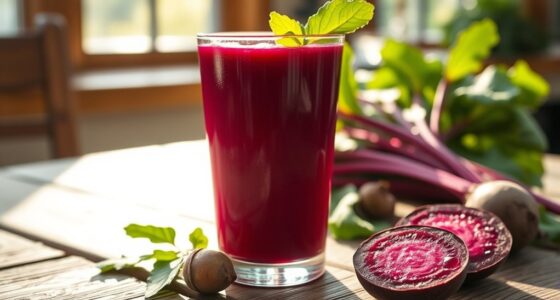Juicing might seem like a quick fix for nutrition, but whole fruits pack benefits you can't ignore. Whole fruits are rich in fiber, which helps with digestion and keeps you feeling full longer. Unlike juices, they regulate blood sugar levels, reducing cravings and the risk of diabetes. Plus, whole fruits boost heart health by delivering balanced nutrients that juices just can't match. Keep exploring to discover more about the advantages of incorporating whole fruits into your diet!
Key Takeaways
- Whole fruits are rich in fiber, promoting digestion and satiety, while juices lack this essential component, leading to increased hunger.
- Consuming whole fruits can lower diabetes risk by 23%, whereas daily juice intake may increase diabetes risk by 21%.
- Whole fruits provide a balance of vitamins and minerals that support heart health, unlike juices that lack dietary fiber and nutrients.
- The fiber in whole fruits helps regulate blood sugar levels, preventing spikes and enhancing overall blood sugar control.
- Smoothies, which retain fiber, are a healthier alternative to juices, offering nutrient absorption without sacrificing health benefits.
Understanding Juicing and Its Process

When you think about juicing, it's essential to understand how the process works. Juicing involves extracting the liquid from whole fruits and vegetables, leaving behind the pulp, which contains important fiber. This extraction creates a smooth liquid, often viewed as nutrient-dense.
However, while you get a concentrated dose of nutrients, the lack of fiber can lead to rapid blood sugar spikes, as there's nothing to slow down absorption. Cold-pressed juicing can minimize heat and oxidation, preserving more vitamins and minerals than traditional methods.
Keep in mind that juices don't provide the complete nutritional benefits of whole fruits, as they lack the dietary fiber necessary for digestive health and blood sugar stabilization.
Nutritional Benefits of Whole Fruits

When you choose whole fruits over juices, you benefit from their rich fiber content, which aids digestion and keeps you feeling full.
This fiber also helps regulate blood sugar levels, leading to more stable energy throughout the day.
Plus, whole fruits deliver essential nutrients more efficiently, ensuring you get the most out of your diet. Additionally, consuming whole fruits can contribute to gut health benefits through their natural fiber and nutrient composition.
Fiber Content Importance
Although many people enjoy the revitalizing taste of fruit juices, the importance of fiber content in whole fruits can't be overlooked. Fiber is essential for digestive health and helps regulate blood sugar levels, preventing spikes that often come with juicing. Whole fruits are rich in fiber, which acts as a prebiotic, promoting beneficial gut bacteria vital for metabolic health. Plus, consuming fiber-rich whole fruits enhances satiety, making you less likely to overeat. Additionally, a diet high in fiber can help prevent constipation in newborns, ensuring a healthy digestive system from an early age.
Here's a quick comparison of fiber content:
| Fruit | Fiber (grams) | Health Benefits |
|---|---|---|
| Apple | 4 | Supports gut health |
| Banana | 3 | Regulates blood sugar |
| Orange | 4 | Lowers chronic disease risk |
| Raspberry | 5 | Promotes fullness |
Nutrient Absorption Efficiency
Whole fruits excel in nutrient absorption efficiency, primarily due to their intact fiber content.
Unlike the juicing process, which strips away most of this beneficial fiber, whole fruits allow your body to absorb nutrients more effectively. The fiber in whole fruits slows down sugar absorption, promoting healthy digestion and reducing the risk of sugar spikes that often accompany fruit juices.
Plus, whole fruits provide a broader spectrum of phytonutrients and vitamins, enhancing your overall nutritional intake. Research even links eating whole fruits to a 23% lower risk of diabetes, highlighting the significant health benefits of consuming fruits in their natural state. Additionally, consuming whole fruits can aid in appetite suppression, making it easier to maintain a healthy weight and avoid late-night snacking.
Blood Sugar Regulation
Eating whole fruits plays an essential role in blood sugar regulation due to their high fiber content. This fiber slows the absorption of sugars, helping you maintain stable blood sugar levels and preventing the spikes often associated with juice consumption.
A Harvard study found that drinking fruit juice daily increases the risk of developing diabetes by 21%, while consuming two servings of whole fruit weekly lowers that risk by 23%. Whole fruits offer a balance of crucial vitamins, minerals, and phytochemicals, which juices often lack.
The Importance of Fiber in Your Diet

Fiber plays an essential role in your digestive health, helping to keep your bowel movements regular and your gut microbiome thriving.
It also supports blood sugar regulation and can lower your cholesterol levels, reducing the risk of heart disease. Additionally, a high-fiber diet, such as one rich in baked kale, has been shown to promote digestive health and contribute to overall well-being.
Role in Digestion
While many people focus on the vitamins and minerals found in fruits, the importance of fiber in your diet can't be overlooked.
Fiber plays a significant role in digestion, helping regulate bowel movements and preventing constipation by adding bulk to your stool. Whole fruits are packed with both soluble and insoluble fiber, which slows down digestion and promotes stable blood sugar levels. This balance reduces the risk of spikes that can disrupt your energy.
Additionally, consuming fiber-rich foods like whole fruits encourages the growth of beneficial gut bacteria, enhancing your digestive health and boosting your immune system. A high-fiber diet lowers your risk of digestive disorders, making whole fruits an essential part of your daily meals. Watering techniques for large indoor plants may also benefit from the fiber found in fruits, as it supports overall health and well-being.
Aim for that recommended intake of 25 to 38 grams!
Blood Sugar Regulation
Maintaining stable blood sugar levels is essential for overall health, and that's where fiber comes into play. Whole fruits are packed with dietary fiber, which slows down sugar absorption into your bloodstream, helping to prevent those dreaded spikes in blood glucose.
In contrast, when you consume juice, you miss out on that fiber, leading to quicker absorption and increased blood sugar levels. Research shows that daily fruit juice consumption may increase diabetes risk by 21%, while opting for whole fruits can lower that risk by 23%. Additionally, antioxidants in fruits help combat oxidative stress, which can further support blood sugar regulation.
Heart Health Benefits
Eating whole fruits not only benefits your blood sugar regulation but also plays an essential role in heart health. Fiber, especially soluble fiber found in fruits, helps lower cholesterol levels, reducing your risk of heart disease by 30-50%. The American Heart Association suggests at least 25 grams of fiber daily for ideal heart health. By incorporating whole fruits into your diet, you're taking a significant step toward maintaining a healthy heart. Additionally, consuming a variety of fruits can help you maximize IRA contributions by providing essential nutrients that support your overall well-being.
| Type of Fiber | Source | Heart Health Benefit |
|---|---|---|
| Soluble Fiber | Apples, Oranges | Lowers cholesterol levels |
| Insoluble Fiber | Berries, Pears | Promotes digestive health |
| Total Fiber | Bananas, Grapes | Reduces heart disease risk |
| Dietary Fiber | Avocados | Regulates blood sugar levels |
| Fiber-Rich | Citrus Fruits | Supports overall heart health |
Blood Sugar Control: Juicing vs. Whole Fruits

When it comes to blood sugar control, the choice between juicing and whole fruits can greatly impact your health.
Juicing might seem healthy, but it often leads to rapid spikes in blood sugar levels due to the lack of fiber. Whole fruits, on the other hand, provide essential fiber that slows sugar absorption and helps regulate blood sugar levels effectively.
A Harvard study even found that daily juice consumption increases the risk of diabetes by 21%, while eating whole fruits lowers that risk by 23%.
By choosing whole fruits, you promote a slower release of sugars into your bloodstream, enhancing your blood sugar control and reducing hunger and cravings. Additionally, green juices can detoxify the body, but they should not replace the benefits of consuming whole fruits for maintaining balanced blood sugar levels.
Make the switch for better health outcomes!
Satiety and Hunger: How Juicing Affects You

Choosing whole fruits over juicing not only impacts blood sugar control but also plays a significant role in how satisfied you feel after eating.
Whole fruits are packed with fiber, which promotes satiety and helps regulate hunger. When you juice, most of that fiber is removed, causing the liquid to be absorbed quickly. This often leads to increased feelings of hunger soon after consumption, undermining your weight loss efforts.
Without fiber, blood sugar levels can spike, resulting in cravings and a desire to snack. On the other hand, incorporating whole fruits into your diet allows for slower digestion and a longer-lasting sense of fullness, making it easier to manage your appetite and stay on track with your weight loss goals. Additionally, high protein breakfasts can further enhance feelings of fullness and support weight management.
Weight Management: The Role of Fiber

Fiber is essential for effective weight management, as it helps you feel full and satisfied after meals. By incorporating whole fruits into your diet, you're not just enjoying their natural sweetness, but also benefiting from the significant fiber content they provide.
This fiber slows down sugar absorption, preventing those rapid spikes in blood sugar that can leave you hungry soon after eating. Studies show that diets high in fiber are linked to lower obesity risks, promoting weight loss and better body composition.
Juicing, on the other hand, removes most of this fiber, making it easier to overeat later. Prioritizing fiber-rich foods like whole fruits can enhance your digestive health and regulate appetite, supporting your long-term weight management goals. Additionally, increased focus on organic farming practices in food production emphasizes the importance of consuming whole, unprocessed foods for overall health.
Making Informed Choices: Juicing or Eating Whole?

Whole fruits offer significant benefits for weight management, but you might wonder whether juicing could be a better option for your health.
While juicing can be invigorating, it often strips away essential fiber, which is vital for digestive health and blood sugar regulation. Whole fruits provide a slower absorption of sugars, minimizing the risk of blood sugar spikes linked to juice consumption. Additionally, whole fruits contain a variety of vitamins, minerals, and antioxidants that are preserved in their natural form, contributing to overall wellness. While juicing can offer concentrated nutrients in a convenient way, it’s important to weigh the juicing health benefits compared to fruits, as the latter not only supports digestive health but also promotes satiety, which can aid in weight management. Emphasizing whole fruits in your diet may lead to more sustained energy levels and better long-term health outcomes.
A Harvard study even found that daily fruit juice intake increases diabetes risk by 21%.
When choosing between juicing and whole fruits, remember that smoothies retaining fiber can be more beneficial.
Prioritizing whole foods over juice leads to better health outcomes, delivering essential nutrients and a satisfying sense of fullness that juices simply can't replicate.
Frequently Asked Questions
Is It Better to Juice or Just Eat the Fruit?
When deciding whether to juice or just eat the fruit, think about your goals.
Juicing strips away fiber, which is vital for digestion and keeping your blood sugar stable. Eating whole fruits allows for slower sugar absorption, helping you avoid spikes.
Plus, whole fruits provide essential nutrients that juicing often misses. If you want sustained energy and fullness, sticking with whole fruits is your best bet for overall health.
Which Is Better, Eating Fruits or Drinking Juice?
You've heard the saying, "An apple a day keeps the doctor away."
When it comes to choosing between eating fruits or drinking juice, whole fruits are definitely the better option. They pack essential fiber that aids digestion and helps regulate blood sugar levels.
Juices, even if they're 100% fruit, often lack this fiber, leading to quicker sugar absorption and potential health risks.
What Is One Downside About Juicing?
One major downside of juicing is that it strips away most of the dietary fiber found in whole fruits.
Without this fiber, you might experience rapid spikes in blood sugar, which can lead to increased hunger and cravings shortly after you drink juice.
This can make it harder for you to maintain steady energy levels and regulate your appetite effectively.
What Is the Major Downside of Drinking Fruit Juice to Meet Your Daily Fruit Needs?
Isn't it ironic how you might think fruit juice is healthy, yet it often strips away essential nutrients?
The major downside of drinking fruit juice to meet your daily fruit needs is the loss of dietary fiber. Without fiber, you risk rapid blood sugar spikes, increased calorie intake, and reduced satiety.
Whole fruits provide vital nutrients and help manage weight, making them a far better choice for your health and well-being.
Conclusion
In the end, choosing between juicing and whole fruits is like deciding between a quick snapshot and a vibrant painting. While juice can capture a moment of flavor, whole fruits invite you into a feast of nutrients, texture, and fiber. Think of that satisfying crunch of an apple, filling you up while providing lasting energy. So, next time you reach for a drink, consider picking up that whole fruit instead—your body will thank you for the vibrant masterpiece!
Susannah expertise lies in researching and compiling evidence-based content on juicing, nutrition, and overall health. She is committed to ensuring that The Juicery World offers accurate, up-to-date, and trustworthy information to empower readers to take control of their health. Susannah’s goal is to inspire individuals to embrace juicing as a way to nourish their bodies and live their best lives.











